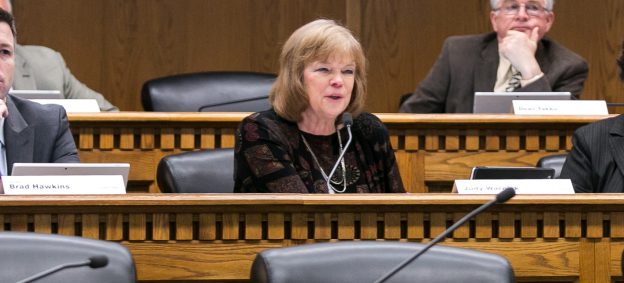Tag Archives: Sen. Judy Warnick
Senate approves measure to increase number of tasting rooms
The state Senate today approved legislation sponsored by Sen. Judy Warnick that would expand the number of tasting rooms small wineries can operate from two to four. Senate Bill 5426 was approved overwhelmingly, 44 to 5, and goes to the House of Representatives for consideration.
“We have many small wineries that are in need of this kind of support,” said Warnick, R-Moses Lake. “This is a good small-business bill to help a growing industry thrive.”
The Liquor and Cannabis Board, which heavily regulates the industry, limits the number of tasting rooms a winery may operate separate from its manufacturing site, and must still approve any additional tasting rooms.
Warnick added, “It can be hard for small business to compete with large retailers; this legislation allows small wineries to get their products to consumers in an innovative and practical way.”
Sen. Judy Warnick, R-Moses Lake, and Reps. Matt Manweller, R-Ellensburg, and Tom Dent, R-Moses Lake, are holding an hour-long telephone town hall on Monday, March 13, at 6 p.m. The program is similar to a call-in radio show in which people may call and ask questions over the telephone and participate in surveys.
To participate, residents can call (509) 941-2750 during the event. If listeners have questions during the call, they can press the star (*) key on their telephone keypads.
For more information about the telephone town hall, residents can contact:
Sen. Warnick at (360) 786-7624 or judy.warnick@leg.wa.gov
Rep. Manweller at (360) 786-7808 or matt.manweller@leg.wa.gov
Rep. Dent at (360) 786-7932 or tom.dent@leg.wa.gov
The 13th Legislative District includes Kittitas and Lincoln counties, most of Grant and a part of Yakima County.
For more information about Sen. Warnick, visit:
www.judywarnick.src.wastateleg.org
For more information about Rep. Manweller, visit:
www.representativemattmanweller.com
For more information about Rep. Dent, visit:
www.representativetomdent.com
Sen. Judy Warnick’s legislation to fix the Hirst decision was approved Tuesday evening by the state Senate, despite efforts by some opposition Democrats to delay a legislative response that would aid rural homeowners. The decision, issued by the state Supreme Court in late 2016, effectively prevents the drilling of small, household wells without costly studies that must be done before a building permit is issued. Senate Bill 5239, The bill was approved 28 to 21 and now goes to the House of Representatives for consideration.
On the Senate floor, Warnick, who chairs the Senate’s water-related committee, read from the high court’s dissenting opinion: “The practical result of this holding is to stop counties from granting building permits that rely on permit-exempt wells. Not only is this contrary to the clear legislative purpose of RCW 19.27.097, it potentially puts counties at odds with the Department of Ecology and imposes impossible burdens on landowners.”
The Hirst decision effectively halts development in many of Washington’s 39 counties, hitting rural areas the hardest. It would have a chilling effect on rural economic development by requiring local governments to make legal determinations of water availability – work already done by the state Department of Ecology – and sets up a situation where local jurisdictions and the state could be at odds issuing permits for small, household wells.
“During the committee hearing, we had everyday people pleading with us to fix this issue,” Warnick said. “I am confident that this is the right path forward. We have worked with stakeholders, reviewed our state’s water-law history and brought forth this legislation as a good-faith solution for the people in our state who are suffering because of this court decision.”
“Not fixing this flawed decision means hundreds of millions of dollars’ worth of lost economic activity for our state and potentially the loss of a person’s life savings,” said Warnick. “Local jurisdictions are looking to us for clarity and guidance and this bill provides that.”
“This bill is not just about wells or water law. It is about people and the significant and negative impact this decision has had on their property and future,” Warnick added.
Podcast: Play in new window | Download
Sen. Judy Warnick’s legislation to have air-quality rules treat cattle feedlots the same as other agricultural operations was approved today by the state Senate.
Agricultural operations are exempt from state clean-air rules; Warnick’s Senate Bill 5196 would extend the exemption to feedlots while establishing a process and guidelines for addressing activities that may be detrimental to the environment.
“I think this is a good compromise bill which balances the rights of our cattle producers with environmental concerns, although I am disappointed with the final vote,” said Warnick, R-Moses Lake, who chairs the Senate Agriculture, Water, Trade and Economic Development Committee. “Other agricultural activities are exempt from these kinds of regulations, so this adjustment to state law makes sense. We are still ensuring best practices to keep our environment clean and providing a transparent process when a violation occurs. I wish we would have seen more bipartisan support for this common sense legislation.”
Cattle operations are still required to adhere to state Department of Ecology rules regarding dust control. The legislation would require that violations be clearly documented with evidence, setting a higher bar than current practice.
“In some areas of our state, raising cattle is a dusty business, but we know that impacts are temporary,” said Warnick. “If there are serious violations, then we want to deal with them, but this bill would provide for increased protections for our well-meaning cattle-industry partners.”
The bill was approved by a vote of 30-19 and now goes to the House of Representatives for consideration.
|
The chair of the Senate’s water-policy committee has responded to an anti-rural ruling from the state Supreme Court by filing legislation concerning the availability of water for new household wells. Sen. Judy Warnick, R-Moses Lake, has scheduled Senate Bill 5239 for a public hearing Tuesday, Jan. 24 at 8 a.m. before the Senate Agriculture, Water, Trade and Economic Development Committee.
Warnick says the high court’s recent Hirst decision would effectively halt development in many of Washington’s 39 counties, hitting rural areas the hardest. It would have a chilling effect on rural economic development by requiring local governments to make legal determinations of water availability – work already done by the state Department of Ecology – and sets up a situation where local jurisdictions and the state could be at odds issuing permits for small, household wells.
Her measure would support development in rural areas by limiting the factors that drive up the cost of obtaining water supplies for new-home construction.
“Water is already a critical issue for our state,” Warnick said. “This court decision makes our problems even worse and shows a real disconnect between the court and everyday Washingtonians. Many in rural communities around the state view this action as a war on rural Washington because so many people rely on these household wells that previously have never been an issue.”
In practice, the case requires counties with already limited resources to conduct costly studies on water availability for wells that have for decades been exempt due to the extremely low amounts of water used for household purposes. The costs of the studies, which could add thousands of dollars to the cost of homebuilding in rural areas, likely would be passed on to homeowners.
“We face a situation where people in rural areas who don’t have the luxury of hooking up to city water now have very few options,” Warnick said. “We are one Washington, but the realities faced by the communities I represent sometimes don’t get the attention they deserve. We are talking about families who will now have to pay tens of thousands of more dollars to get water because the state Supreme Court has taken decades of water law and turned it on its head.”
“I am hopeful that my bill will provide a collaborative approach, needed relief, and certainty in the wake of this bizarre court decision,” Warnick added.
Podcast: Play in new window | Download

|
|
Greetings Friends and Neighbors
It has been a busy first week of the legislative session. Now that all the pomp and circumstance is over it is time to roll up my sleeves and get to work. Wednesday I was selected by my colleagues to serve as the Vice Chair of the Senate Republican Caucus. In this capacity I will help preside at internal meetings and coordinate committee activities as liaison between leadership and committee chairs. My committee, Agriculture, Water, Trade and Economic Development, met for the first time this past Thursday to consider some legislation pertaining to water, one of my top priorities. Read more two of the bills that were heard and a link to the video of the proceedings. Senate Bill 5010 – Promoting water conservation by protecting certain water rights from relinquishment. This bill would give agricultural water users credit for their conservation efforts. Right now there is somewhat of a negative incentive for people to use more water than they need because it is a use-it-or-lose-it system under current law. Senate Bill 5003 – Clarifying authority of the department of ecology regarding minimum flow. This legislation would give more flexibility to the state Department of Ecology to make more water available. This comes on the heels of some cities not being able to get water even after implementing mitigation efforts. It clarifies existing law.
 It is an honor to serve as your state Senator. Please do not hesitate to reach out to my office with any questions or concerns you may have regarding your state government. Please watch your email, as I look forward to providing you with regular updates throughout the session.
Judy Warnick, 13th District Senator  Share my E-newsletterDo you know others who live in our district who may not be receiving my e-news updates? Please feel free to forward this e-mail invitation to them or click on the share button below. If you have received this without directly subscribing, please visit my website by clicking here and sign up to receive my e-newsletters!  Contact MeOlympia Office:103 Irv Newhouse Bldg. P.O. Box 40410 Olympia, WA 98504 District Phone:509.766.6505 Olympia Phone:360.786.7624 E-mail:Website: |
|

 |
The 2017 legislative session began last week with Sen. Judy Warnick, R-Moses Lake, continuing to lead the Senate committee that addresses agricultural, water and economic-development issues. She also has been promoted to the position of vice chair of the Senate’s majority caucus.
Before legislators returned to the Capitol for their scheduled 105-day session, Warnick’s Republican-led Majority Coalition Caucus merged the committee she headed the past two years, which covered agriculture, water and rural economic development, with the committee that dealt with trade and economic development. The larger panel that resulted, dubbed by some as the “supercommittee,” is now known as the Senate Agriculture, Water, Trade and Economic Development Committee.
In addition, Warnick will act as a negotiator for the state’s capital budget.
“Communities around our state have benefited from wise investments through the capital budget,” Warnick said. “I spent years working on the capital budget in the House of Representatives, and look forward to continuing this valuable work.”
As the MCC vice chair, Warnick will help preside at internal meetings and coordinate committee activities as liaison between leadership and committee chairs.
“I am also excited to work with my Senate colleagues in this new leadership role,” Warnick added. “I am a consensus builder and hope I can lend my skills to move the conversation on policies we are considering.”
“This session there is a lot of focus on education – it is our state’s paramount duty,” said Warnick. “I am committed to making sure our state provides a quality education to all students. There are also other priorities that I hope to address such as the recent state Supreme Court ruling – the Hirst decision – that will impact rural home building and access to water. I will also be looking at local land-use planning as it relates to marijuana-growing operations and the work I did over the interim on the Governor’s Blue Ribbon Commission on Children and Families.”
Podcast: Play in new window | Download









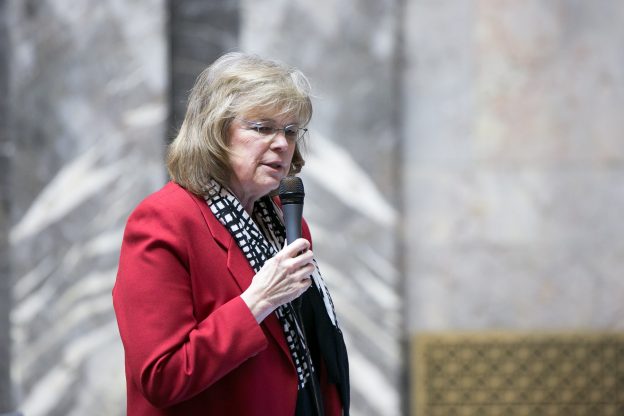
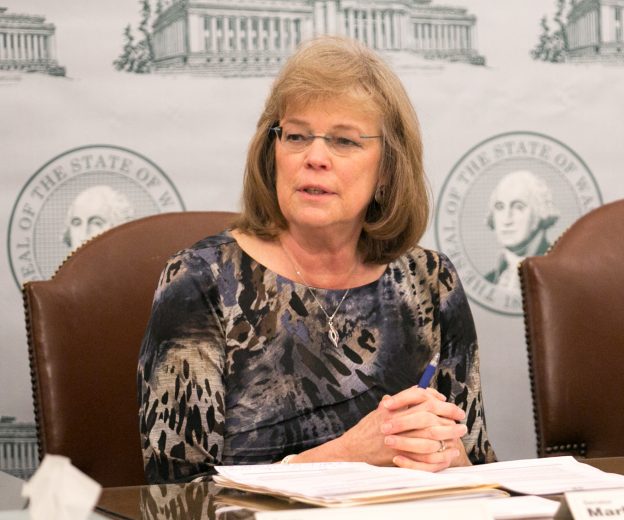
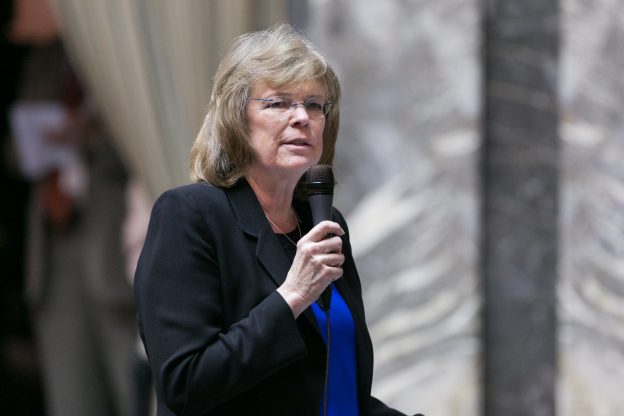
 Managing our state’s livestock
Managing our state’s livestock Protecting our state’s vulnerable
Protecting our state’s vulnerable Rural Economic Development
Rural Economic Development
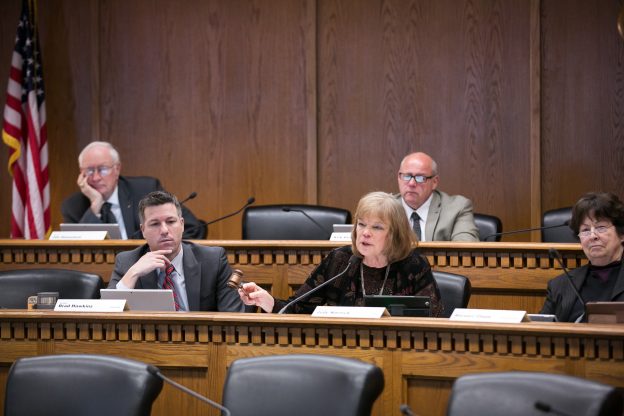
 January 17, 2017
January 17, 2017

